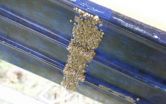(Press-News.org) The human body has a love-hate relationship with iron. Just the right amount is needed for proper cell function, yet too much is associated with brain diseases like Alzheimer's and Parkinson's.
Science knows that men have more iron in their bodies and brains than women. These higher levels may be part of the explanation for why men develop these age-related neurodegenerative diseases at a younger age.
But why do women have less iron in their systems than men? One possible explanation for the gender difference is that during menstruation, iron is eliminated through the loss of blood.
Now, a new study by UCLA researchers confirms this suspicion and suggests strategies to reduce excess iron levels in both men and women. Dr. George Bartzokis, a professor of psychiatry at the Semel Institute for Neuroscience and Human Behavior at UCLA, and colleagues compared iron levels in women who had undergone a hysterectomy before menopause -- and thus, did not menstruate and lose iron -- with levels in postmenopausal women who had not had a premenopausal hysterectomy. They found the women who had undergone a hysterectomy had higher levels of iron in their brains than the women who hadn't, and further, they had levels that were comparable to men.
The research is reported in the current online edition of the journal Neurobiology of Aging.
The researchers used an MRI technique that can measure the amount of ferritin iron in the brain (ferritin is a protein that stores iron). They examined 39 postmenopausal women, 15 of whom had undergone a premenopausal hysterectomy. They looked at several areas in the brain three white-matter regions and and five gray-matter regions. Fifty-four male subjects were also imaged for comparison.
The researchers found that among the women, the 15 who had undergone a hysterectomy had concentrations of iron in the white-matter regions of the brain's frontal lobe that did not differ from the men's levels. Further, both the women who had a hysterectomy and the men had significantly higher amounts of iron than the women who had not undergone a hysterectomy. (Gray matter areas showed slight increases that were not statistically significant.)
Hysterectomy is the most common non-obstetrical surgery among women in the United States, with one in three having had a hysterectomy by age 60, said Bartzokis, who is also a member of the UCLA Laboratory of Neuro Imaging and the UCLA Brain Research Institute.
The results of this study, he said, suggest that menstruation-associated blood loss may explain gender differences in brain iron. And of interest to both men and women, he said, is that it's possible that brain iron can be influenced by peripheral iron levels -- that is, iron levels throughout the body -- and may thus be a modifiable risk factor for age-related degenerative diseases.
"Iron accumulates in our bodies as we age," Bartzokis said, "and in the brain contributes to the development of abnormal deposits of proteins associated with several prevalent neurodegenerative diseases, such as Alzheimer's disease, Parkinson's disease and dementia with Lewy bodies. Higher brain iron levels in men may be part of the explanation for why men develop these age-related neurodegenerative diseases at a younger age, compared to women."
Bartzokis suggests it may be possible to reduce age-related brain iron accumulations by reducing the levels of iron throughout the body. This may have health benefits, especially in men, and may help counteract the negative effects of aging on the brain by reducing the iron available to catalyze, or speed up, damaging free-radical reactions.
There are a few ways body stores of iron can be reduced naturally, especially for premenopausal women. Menstruation leads to the elimination of iron through loss of blood. During pregnancy, iron is transferred from the woman to the fetus, and when women breast-feed, iron is transferred to the baby through the mother's milk.
"But there are things postmenopausal women and especially men can do to reduce their iron levels through relatively simple actions," Bartzokis said. "These include not overloading themselves with over-the-counter supplements that contain iron, unless recommended by their doctor; eating less red meat, which contains high levels of iron; donating blood; and possibly taking natural iron-chelating substances, molecules that bind to and remove iron, such as curcumin or green tea, that may have positive health consequences."
###
Other study authors were Todd A. Tishler, Erika P. Raven, Po H. Lu and Lori L. Altshuler, all of UCLA. Funding was provided by the National Institutes of Health, the U.S. Department of Veterans Affairs and the RCS Alzheimer's Foundation.
Bartzokis has consulted for and received funding from Janssen Pharmaceutical Inc. and Novartis. Lori L. Altshuler received honoraria from Abbott Laboratories, Bristol-Meyers Squibb, Forest Laboratories and GlaxoSmithKline and is currently on an advisory board for Forest Laboratories; she has been on the speaker's bureaus for Forest Laboratories, GlaxoSmithKline, and AstraZenec. All other authors declare no conflicts of interest.
The UCLA Department of Psychiatry and Biobehavioral Sciences is the home within the David Geffen School of Medicine at UCLA for faculty who are experts in the origins and treatment of disorders of complex human behavior. The department is part of the Semel Institute for Neuroscience and Human Behavior at UCLA, a world-leading interdisciplinary research and education institute devoted to the understanding of complex human behavior and the causes and consequences of neuropsychiatric disorders.
For more news, visit the UCLA Newsroom and follow us on Twitter.
Hysterectomy is associated with increased levels of iron in the brain
University of California Los Angeles study suggests reducing iron may lower age-related brain disease risk
2011-10-06
ELSE PRESS RELEASES FROM THIS DATE:
A coating that prevents barnacles forming colonies
2011-10-06
It is not necessary for an effective anti-fouling coating to release toxins into the environment. Scientists at the University of Gothenburg have shown that it is instead possible to mix into the coating molecules on which the adult barnacles cannot grow. The result has been published in the scientific journal Biofouling.
Fouling of hulls is a problem for all boat owners, and one of the most difficult organisms to deal with is barnacles. A research group at the Department of Cell and Molecular Biology has therefore studied the biology of barnacles in detail, and focussed ...
Fabulous and Over 40? The New Range of Mary Portas Tights Now Available at MyTights.com
2011-10-06
Retail guru Mary Portas and famous hosiery brand Charnos have joined forces to create a fabulous range of tights aimed at women that that want to look stylish and fashionable in their forties, fifties and beyond. The sensational range of Mary Portas tights which includes spots, stripes, argyle patterns, lace and luxurious basics is now available at MyTights.com.
Mary Portas has collaborated with Charnos to design a new hosiery collection that takes the season's key trends and makes them wearable for grown up women. Fabulous and fashionable whatever your age, the Mary ...
Fishy behaviour
2011-10-06
A fish's personality may determine how it is captured. This association between personality difference and capture-technique could have significant evolutionary and ecological consequences for affected fish populations, as well as for the quality of fisheries.
Anglers fishing near rocky outcrops or in areas of water with submerged vegetation may be more likely to catch timid fish, while those fishing in open water may be more likely to reel in bolder fish, according to new research conducted at Queen's University Biological Station.
"Boldness -- the tendency of an ...
Intensive training helps children with reading and writing difficulties
2011-10-06
Intensive daily training for a limited period is better for children with reading and writing difficulties than the traditional remedial tuition offered by schools, reveals new research from the University of Gothenburg.
Around 5% of school children in Sweden have problems learning to read and write on account of difficulties with word decoding.
Phonemic building blocks
"Most researchers agree that the underlying problem is a limited phonological ability, in other words limited awareness of the sounds that make up spoken words," says Ulrika Wolff, senior lecturer in ...
Business Trader Now Has Multiple Listing Options for Sellers
2011-10-06
Business-Trader.com.au is a leading online marketplace designed to help Australians buy or sell a business. We've added additional features to our services and now offer multiple listings of businesses for sale, with resources for Australian business buyers and sellers.
Our database contains listings of all categories of businesses including franchising opportunities and online websites. Business-Trader features multiple listing options for sellers and we also provide professional listing services for business brokers. Our business broker listings are available for ...
Calorific controversy for intensive care patients
2011-10-06
Patients who are fed more calories while in intensive care have lower mortality rates than those who receive less of their daily-prescribed calories, according to a recent study of data from the largest critical care nutrition database in the world.
"Our finding is significant as there have been a number of previous studies in the area of critical care nutrition that have produced conflicting clinical recommendations and policy implications," says study lead Daren Heyland, a professor of Medicine at Queen's, director of the Clinical Evaluation Research Unit at Kingston ...
Reliant Technology Announces IBM Cost Reduction System
2011-10-06
Reliant Technology would like to announce the new IBM Cost Reduction System, a strategic cost reduction strategy for IBM customers with limited budgets and growing data storage costs. Reliant Technology has created this system to help enterprises find cost-saving IBM storage solutions that will meet the data demands of the future despite stagnant or declining IT budgets.
IBM customers can depend on Reliant Technology for competitive prices on used IBM equipment, IBM upgrades, IBM SAN equipment, replacement disks, and tape drives. Reliant Technology offers IBM DS3000, ...
To win hearts and minds, focus on small projects, study finds
2011-10-06
U.S. efforts to bring stability to Iraq and Afghanistan in recent years have focused less on killing insurgents and more on gaining the cooperation of the local population. But does this population-centered approach to counterinsurgency actually work?
A study published today (October 4, 2011) in the Journal of Political Economy finds evidence that it does.
The study, by economist Eli Berman (University of California, San Diego) and political scientists Jacob Shapiro (Princeton) and Col. Joseph Felter (Stanford), focused on the Commander's Emergency Response Program ...
Partnership focuses on developing East Coast fever vaccine
2011-10-06
This press release is available in Spanish.
A vaccine that protects cattle against East Coast fever, a destructive disease in eastern and central Africa, is being developed by scientists at the U.S. Department of Agriculture (USDA) and the International Livestock Research Institute (ILRI) in Kenya.
Entomologist Glen Scoles, veterinary medical officer Massaro Ueti and research leader Don Knowles at the Agricultural Research Service (ARS) Animal Disease Research Unit (ADRU) in Pullman, Wash., have been working on the collaborative project for more than five years. ARS ...
Scientists identify microbes responsible for consuming natural gas in Deepwater Horizon spill
2011-10-06
In the results of a new study, scientists explain how they used DNA to identify microbes present in the Gulf of Mexico following the Deepwater Horizon oil spill -- and the particular microbes responsible for consuming natural gas immediately after the spill.
Water temperature played a key role in the way bacteria reacted to the spill, the researchers found.
Proceedings of the National Academy of Sciences (PNAS) published the results in this week's journal.
David Valentine and Molly Redmond, geochemists at the University of California at Santa Barbara (UCSB) conducted ...
LAST 30 PRESS RELEASES:
Study reveals insights about brain regions linked to OCD, informing potential treatments
Does ocean saltiness influence El Niño?
2026 Young Investigators: ONR celebrates new talent tackling warfighter challenges
Genetics help explain who gets the ‘telltale tingle’ from music, art and literature
Many Americans misunderstand medical aid in dying laws
Researchers publish landmark infectious disease study in ‘Science’
New NSF award supports innovative role-playing game approach to strengthening research security in academia
Kumar named to ACMA Emerging Leaders Program for 2026
AI language models could transform aquatic environmental risk assessment
New isotope tools reveal hidden pathways reshaping the global nitrogen cycle
Study reveals how antibiotic structure controls removal from water using biochar
Why chronic pain lasts longer in women: Immune cells offer clues
Toxic exposure creates epigenetic disease risk over 20 generations
More time spent on social media linked to steroid use intentions among boys and men
New study suggests a “kick it while it’s down” approach to cancer treatment could improve cure rates
Milken Institute, Ann Theodore Foundation launch new grant to support clinical trial for potential sarcoidosis treatment
New strategies boost effectiveness of CAR-NK therapy against cancer
Study: Adolescent cannabis use linked to doubling risk of psychotic and bipolar disorders
Invisible harms: drug-related deaths spike after hurricanes and tropical storms
Adolescent cannabis use and risk of psychotic, bipolar, depressive, and anxiety disorders
Anxiety, depression, and care barriers in adults with intellectual and developmental disabilities
Study: Anxiety, gloom often accompany intellectual deficits
Massage Therapy Foundation awards $300,000 research grant to the University of Denver
Gastrointestinal toxicity linked to targeted cancer therapies in the United States
Countdown to the Bial Award in Biomedicine 2025
Blood marker from dementia research could help track aging across the animal world
Birds change altitude to survive epic journeys across deserts and seas
Here's why you need a backup for the map on your phone
ACS Central Science | Researchers from Insilico Medicine and Lilly publish foundational vision for fully autonomous “Prompt-to-Drug” pharmaceutical R&D
Increasing the number of coronary interventions in patients with acute myocardial infarction does not appear to reduce death rates
[Press-News.org] Hysterectomy is associated with increased levels of iron in the brainUniversity of California Los Angeles study suggests reducing iron may lower age-related brain disease risk





